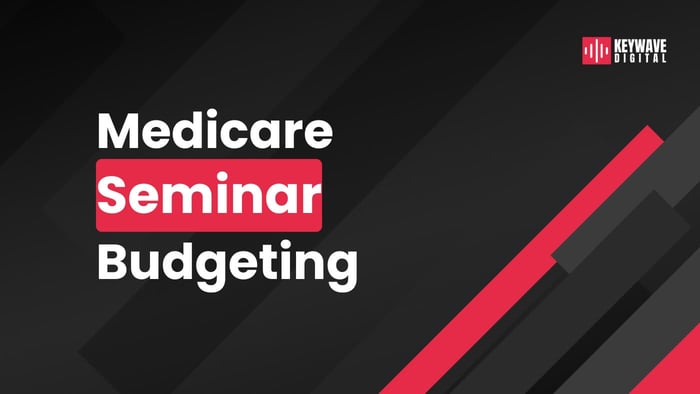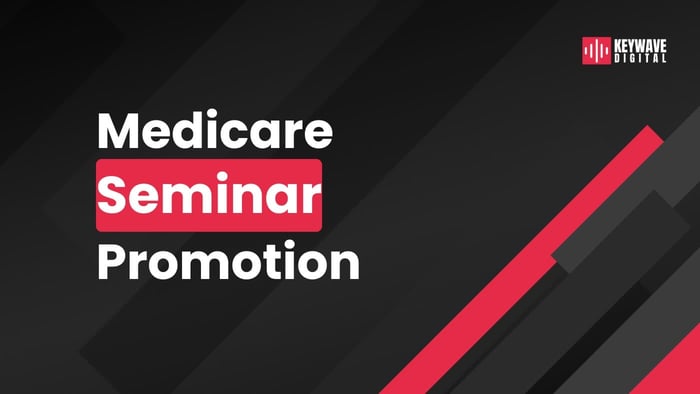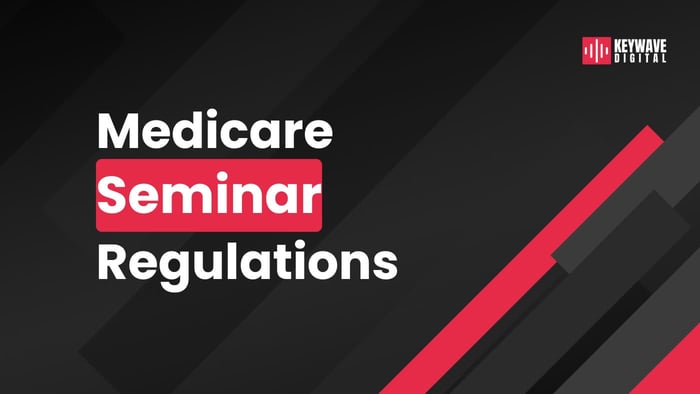Budgeting for a seminar marketing campaign is often underestimated. However, it plays a crucial role in the overall success of your educational seminar.

A well-structured budget helps you plan your expenses accordingly so you won’t overspend. It acts as a financial roadmap in determining how much money will be assigned to each part of your seminar marketing plan.
Picture this: packed rooms, engaged audiences, valuable connections made... all while controlling your budget.
Isn’t that an ideal scenario you want for your educational seminar?
Let’s help you achieve all that!
This comprehensive guide will explore the importance of seminar marketing and tips on achieving your marketing goals while keeping costs in check.
Table Of Contents:
- Average Cost of Seminar Marketing
- Understanding the Costs Involved in Seminar Marketing
- Tips for Budgeting Effectively
- Create a Detailed Budget Plan
- Allocate Funds Wisely
- Set a Separate Fund for Contingencies
- Best Practices for Cost-Effective Seminar Marketing
- Achieve a Cost-Effective Seminar Marketing for Your Brand
Average Cost of Seminar Marketing

Educational seminars typically cost around $1,000 to $1,500 per campaign, which is charged monthly. Costs vary based on factors like location and promotional materials.
A typical seminar marketing campaign includes a landing page, automated emails and SMS, Facebook ads campaigns, appointment reminders, event management software, and more.
While it may seem pricey, don't let this figure intimidate you. Putting the time, effort, and resources is a good way to gain high-quality leads. These costs are easily offset when considering the potential revenue gained from getting appointments and bringing in new clients post-seminar.
Understanding the Costs Involved in Seminar Marketing
Setting a seminar marketing budget allows you to curb overspending habits and maximize your ROI. It enables you to monitor expenses closely and make your event cost-effective. Here is the list of expenses you can expect:
Food and Beverage
The best way to fill the seats at your seminar is by providing free meals.
Offering free meals and refreshments will result in more people signing up and ultimately attending your event.
Although the Centers for Medicare & Medicaid Services (CMS) has removed the nominal restriction on providing meals at educational events, you should spend no more than $15 to $20 per person on food, in our opinion. If this is within your budget, we recommend offering classic food and snacks that are popular at your venue of choice.
Likewise, adding meals to your seminar is a strategic decision. Attendees are more likely to stay throughout the event if meals are provided. Free meals can draw a larger audience and leave a positive impression on your attendees.
Advertising and Lead Generation

Getting the word out is the key to a successful educational seminar.
Costs for advertising and promotion should be included in your overall budget. To reach the right audience, you should invest in online and offline advertising.
At Keywave Digital, we primarily run Facebook ads to promote Medicare and other retirement planning seminars.
The average cost per lead is around $10-$25 for lunch seminars, $8 - $20 for dinner seminars, and $20 - $60 for educational seminars. This fluctuates depending on population size, venue choice, and whether or not you’re offering a free meal. Our recommended advertising spend for a seminar marketing campaign is $700 per seminar minimum.
Promotional Items
According to CMS, you may distribute promotional materials with logos, phone numbers, and website URLs. Handing out business cards is allowed if they don’t mention plan-specific benefits.
Aside from business cards, it’s recommended to print out permission-to-contact (PTC) cards and place them in a specific spot at the seminar venue. Just let the attendees know that getting a PTC card is optional.
While these items are allowed, giving away rebates or cash prizes during and after the seminar is not. Remember that CMS employs secret shoppers who ensure you are fully compliant. Only use compliant marketing materials and enrollment kits for your seminar.
Like Medicare agents, financial advisors and planners may give out promotional and marketing materials. All promotional items should be accurate and not misleading.
Yes, there are compliance rules and regulations that financial advisors and firms must follow when hosting seminars. These rules are in place to protect consumers and ensure that financial advice is provided in a fair and transparent manner.
Tips for Budgeting Effectively

Budgeting for seminar marketing is a critical aspect that can greatly influence its success. Let’s explore the nitty-gritty of seminar budgeting and valuable tips and strategies you should know:
Create a Detailed Budget Plan
Event budget planning isn’t always easy, so start with the basics.
Begin by creating a comprehensive budget plan that covers all aspects of your seminar. A good budget plan is based on well-defined event objectives.
What do you want to achieve in your educational seminar? Do you want to gain more appointments or establish brand awareness? Where do you want to host your seminar?
Your event budgeting should reflect everything you’re picturing for your seminar.
In your budget plan, determine how much money you can spend on your seminar. List all the expenses of your seminar, including marketing, catering, and promotional materials. Be as detailed and realistic as possible when creating a budget plan.
Allocate Funds Wisely
Once you have your budget plan, the next step is to list all potential expenses for budget allocation.
Allocating funds across different categories like marketing and promotion, catering and refreshments, printed materials, and other miscellaneous expenses. With budget allocation, you ensure you have the necessary resources to cover expenses.
A carefully allocated budget allows you to prioritize essential expenses and make informed decisions throughout the planning process.
Set a Separate Fund for Contingencies
You never know when an unexpected expense may arise during your educational seminar. Even the most successful events have unexpected challenges.
That’s why it’s advisable to have a contingency fund to prepare you for such unforeseen expenses. This will help you avoid financial stress, especially when your event is approaching.
The rule of thumb is to have a contingency fund that’s around 15-30% of your total budget.
Best Practices for Cost-Effective Seminar Marketing

Consider these best practices when planning your next seminar and increase the likelihood of your event’s success.
Monitor Your Budget
Always keep a close eye on your expenses from the planning until the end of the seminar. We recommend using a spreadsheet to track every dollar spent. By closely monitoring your budget, you can quickly identify any budget overruns and make necessary adjustments.
Choose the Right Budgeting Method
You have several options when deciding how to allocate funds for your seminar marketing campaign.
One popular strategy suggests spending 10-15% of revenue on marketing. We call this percentage-of-revenue method. This estimates various expenses, assets, and liabilities based on sales.
To reach a target, goal-based budgeting could be the perfect solution. This approach considers specific objectives before assigning numbers, which is ideal if you need more control over where each cent goes.
The final piece of our budgetary trifecta is ROI-based budgeting. As its name implies, it focuses keenly on expected returns from investments made into promotional activities.
Note: Each method has its merits; choose one that aligns best with business needs and performance expectations.
Avoid Common Budgeting Mistakes
We've all seen it: The Dartboard Approach, where budgets are tossed around like darts on a board. But this method is as effective as shooting in the dark.
To achieve cost-effective seminar marketing, you should know budgeting pitfalls and how to avoid them. Some of the most common mistakes when budgeting for seminar marketing are:
- Not setting seminar goals early on.
- Failing to have a buffer or contingency fund.
- Not tracking your expenses.
- Failing to allocate budget.
- Not making informed budget estimates.
- Choosing an unfavorable date and time for your seminar.
Analyze Success Metrics
Remember: A well-crafted budget plan isn't static. Instead, it evolves based on performance metrics and market changes.
That's why you shouldn't forget about success metrics. Use Key Performance Indicators (KPIs) like the number of registrations or follow-up appointments made post-seminar as measures of success.
To effectively measure success, it's essential to have key metrics in place before your seminar begins. Consider factors such as attendance rates, the number of appointments booked post-seminar, or any direct feedback from attendees. These data points provide a quantitative view of how successful your seminar was.
Your marketing efforts for educational seminars shouldn't end once the event ends. Analyzing the results of your event is essential for understanding how successful it was and what needs to be improved. This lets you understand what worked well and where improvements are needed.
Keep in mind that overspending without tracking ROI can lead to financial strain. So keep an eye on your spending and ensure each dollar works towards achieving your goals.
Achieve a Cost-Effective Seminar Marketing for Your Brand
You've learned the costs of seminar marketing and how to budget effectively.
Monitoring your seminar budget matters. So does following the best practices for cost-effective seminar marketing. It's about making every dollar count.
But remember: Tracking results is crucial. It guides future decisions, lets you avoid common mistakes, and chooses effective budget methods.
If you need a professional to execute your financial seminar, Keywave Digital has you covered! We specialize in seminar marketing, including landing page creation, Facebook ads, back-end automation, and more.
Ready to get started with our comprehensive seminar marketing system for insurance agents and financial advisors? Contact us today. Let's work together to make your seminars a resounding success!






